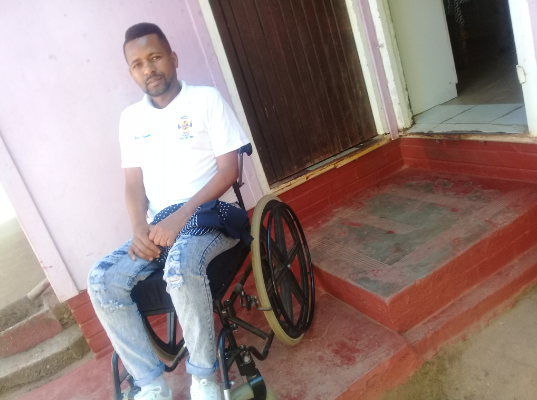 My name is Chris Dyokomba, a 36-year-old Makhanda resident currently on temporary medical boarding. I lost mobility in June 2018 due to a hereditary neuromuscular disorder. I lost power in all my limbs and was referred to Groote Schuur Hospital in Cape Town for further management and assessment.
My name is Chris Dyokomba, a 36-year-old Makhanda resident currently on temporary medical boarding. I lost mobility in June 2018 due to a hereditary neuromuscular disorder. I lost power in all my limbs and was referred to Groote Schuur Hospital in Cape Town for further management and assessment.
It was very difficult when the doctors struggled to treat my condition.
I became wheelchair bound and dependent on people for help with minor tasks such as bathing, physical exercise, preparing meals and transport. Whether you’re born with a disability or became disabled at a later stage, the emotional distress of having to depend on other people for assistance is the same. Some families are not equipped with the skills of looking after people with disabilities.
Here are some tips on home-based care for a physically challenged person
• Keep a diary or set an electronic reminder for all their medical appointments and treatment times.
• If the person is bedridden, the family should collaborate to support them and make it easy for them to ask for help when they need it. Regular bathing, body rubs and regular turning is necessary to avoid bedsores.
• If other family members are occupied with work or school during the day, hire a caregiver to look after your disabled family member.
• Take wheelchair-bound people outdoors as much possible so they can reconnect with the nature.
• People with disabilities need to live life alongside everyone else in the family. They need to have friends visit, watch their favourite TV programmes with their family, have access to books and magazines, go into public places with their family, focus on their spiritual healing and revive their souls.
• A social worker or psychologist can help sensitise family members to the disabled person’s needs.
• Offer your assistance: most people with disabilities are shy to ask for help because they feel like a burden to family and friends. Also your mind your body language – we are very sensitive.
• People with disabilities can benefit from being in organisations or support groups that cater for their special needs.
• People who have lost mobility need to ensure they have a balanced diet with regular appropriate physical exercise. This helps build strength and avoid non-communicable diseases such as diabetes, hypertension, heart disease and auto-immune problems.
A special thanks to my family, friends and personal carer for looking after me. My multi-disciplinary team of doctors, specialists, physiotherapist, occupational therapist, psychologist and social workers are doing a remarkable job and there is already a great improvement.



